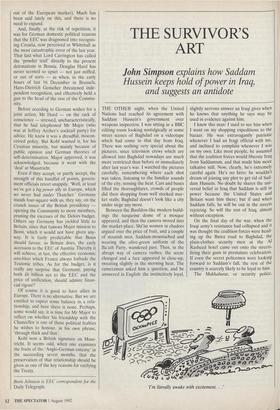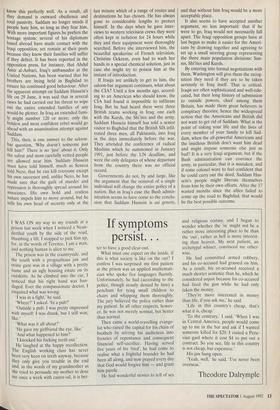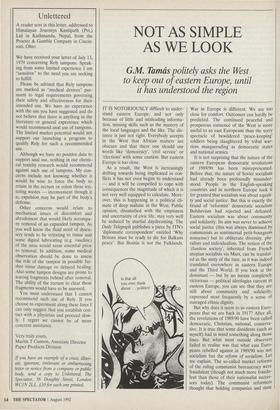THE SURVIVOR'S ART
John Simpson explains how Saddam
Hussein keeps hold of power in Iraq, and suggests an antidote
THE OTHER night, when the United Nations had reached its agreement with Saddam Hussein's government over weapons inspection, 1 was sitting in a BBC editing room looking nostalgically at some street scenes of Baghdad on a videotape which had come in that day from Iraq. There was nothing very special about the pictures, since television crews which are allowed into Baghdad nowadays are much more restricted than before or immediately after last year's war. I watched the pictures carefully, remembering where each shot was taken, listening to the familiar sounds of the city, sensing the heat. Cars and buses filled the thoroughfares, crowds of people did their shopping from well stocked mar- ket stalls; Baghdad doesn't look like a city under siege any more.
Between the Basildon-like modern build- ings the turquoise dome of a mosque appeared, and then the camera moved into the market-place. Shi'ite women in chadors argued over the price of fruit, and a couple of stoutish men, Saddam-moustached and wearing the olive-green uniform of the Ba'ath Party, wandered past. Then, in the abrupt way of camera rushes, the scene changed and a face appeared in close-up, sweating slightly in the morning heat. The cameraman asked him a question, and he answered in English: the instinctively loyal, slightly nervous answer an Iraqi gives when he knows that anything he says may be used in evidence against him.
I knew this man: I used to see him when I went on my shopping expeditions to the bazaar. He was extravagantly patriotic whenever I had an Iraqi official with me, and inclined to complain whenever I was on my own. Like most people, he assumed that the coalition forces would liberate Iraq from Saddamism, and that made him more talkative still. Now, clearly, he's extremely careful again. He's no hero: he wouldn't dream of joining any plot to get rid of Sad- dam Hussein. No doubt he shares the uni- versal belief in Iraq that Saddam is still in power because the United States and Britain want him there; but if and when Saddam falls, he will be out in the streets rejoicing. So will the rest of Iraq, almost without exception.
On the final day of the war, when the Iraqi army's resistance had collapsed and it was thought the coalition forces were head- ing up the Basra road to Baghdad, the plain-clothes security men at the Al Rasheed hotel came out onto the streets, firing their guns in premature celebration. If even the secret policemen were looking forward to Saddam's fall, the rest of the country is scarcely likely to be loyal to him.
The Mukhabarat, or security police,
'I'm literally awake with excitement. . know this perfectly well. As a result, all they demand is outward obedience and total passivity. Saddam no longer minds if People hate him, so long as they fear him. With more important figures he prefers the hostage system: several of his diplomats based abroad have made contact with the Iraqi opposition, yet remain at their posts because they know their families will suffer if they defect. It has been reported in the opposition press, for instance, that Abdul Amir al-Anbari, Iraq's ambassador at the United Nations, has been warned that his brothers are being held in Baghdad to ensure his continued good behaviour. After the apparent attempt on Saddam Hussein's life on 29 June, it was said that in several cases he had carried out his threat to wipe out the entire extended families of any would-be plotter. In Iraq an extended fami- ly might number 120 or more; only the boldest and most confident rebel would go ahead with an assassination attempt against Saddam.
This, then, is one answer to the saloon- bar question, 'Why doesn't someone just kill him?' There is no 'just' about it. Only the safest and most carefully vetted people are allowed near him. Saddam Hussein must have told himself, much as Seneca told Nero, that he can kill everyone except his own successor and, unlike Nero, he has made sure that the guilt of murder and repression is thoroughly spread around his associates. His own bold and restless nature impels him to move around, but he ells his own head of security only at the last minute which of a range of routes and destinations he has chosen. He has always gone to considerable lengths to protect himself. In the days when he gave inter- views to western television crews they were often kept in isolation for 24 hours while they and their equipment were thoroughly searched. Before she interviewed him, the beautiful speakerine of French television, Christine Ockrent, even had to wash her hands in a special chemical solution, just in case she might try to poison him at the instant of introduction.
If Iraqis are unlikely to get to him, the saloon-bar argument continues, what about the CIA? Until a few months ago, accord- ing to an American who should know, the CIA had found it impossible to infiltrate Iraq. But he had heard there were three British teams working in Iraq: one each with the Kurds, the Shi'ites and the army. Saddam Hussein himself has told a senior visitor to Baghdad that the British SIS infil- trated three men, all Pakistanis, into Iraq in the days immediately before the war. They attended the conference of radical Muslims which he summoned in January 1991, just before the UN deadline, and were the only delegates of whose departure from the country there was no official record.
Governments do not, by and large, like the argument that the removal of a single individual will change the entire policy of a nation. But in Iraq's case the Bush admin- istration seems to have come to the conclu- sion that Saddam Hussein is sui generis,
and that without him Iraq would be a more acceptable place.
It also seems to have accepted another argument, no less important: that if he were to go, Iraq would not necessarily fall apart. The Iraqi opposition groups have at last begun to make it easier for the Ameri- cans by drawing together and agreeing to set up a small steering group representing the three main population divisions: Sun- nis, Shi'ites and Kurds.
By entering into formal negotiations with them, Washington will give them the recog- nition they need if they are to be taken seriously in Iraq itself. That is critical. Iraqis are often sophisticated and well-edu- cated, but their long history of submission to outside powers, chief among them Britain, has made them great believers in conspiracy theories; hence the widespread notion that the Americans and British did not want to get rid of Saddam. What is the point of risking your life and the lives of every member of your family to kill Sad- dam, when the all-powerful Americans and the insidious British don't want him dead and might impose someone else just as bad? It is a very Iraqi argument, but if the Bush administration can convince the army, in particular, that it is mistaken, and if some colonel wore to feel confident that he could carry out the deed, Saddam Hus- sein's people might liberate themselves from him by their own efforts. After the 17 wasted months since the allies failed to come up the road to Baghdad, that would be the best possible outcome.
Unlettered
A reader sent in this letter, addressed to Himalayan Journeys Kantipath (Pvt.) Ltd in Kathmandu, Nepal, from the Procter & Gamble Company in Cincin- nati, Ohio: We have received your letter of July 13, 1979 concerning Rely tampons. Speak- ing from some limited experience I am "sensitive" to the need you are seeking to fulfill.
Please be advised that Rely tampons are marked as "medical devices" pur- suant to legal requirements governing their safety and effectiveness for their intended use. We have no experience with the use you have suggested and do not believe that there is anything in the literature or general experience which would recommend anal use of tampons. The limited market potential would not support our launching a program to qualify Rely for such a recommended use.
Although we have no positive data to support anal use, nothing in our chemi- cal toxicity research would recommend against such use of tampons. My con- cerns include not knowing whether it would be wise to force the body to retain in the rectum or colon these irri- tating wastes — inconvenient though it is, expulsion may be part of the body's defense.
Other concerns would relate to mechanical issues of discomfort and abradement that would likely accompa- ny removal of an expanded tampon. As you well know the fluid stool of dysen- tery tends to be irritating to tissue and some digital lubricating (e.g. vaseline) of the anus would seem essential prior to removal. In addition, some medical observation should be done to assess the role of the tampon in possible fur- ther tissue damage or delayed healing. Also some tampon designs are prone to leaving fragments behind after removal. The ability of the rectum to clear these fragments would have to be assessed.
You must understand that I cannot recommend such use of Rely. If you choose to experiment along these lines I can only suggest that you establish con- tact with a physician and proceed slow- ly. I regret we cannot be of more concrete assistance.
Very truly yours, Martin T Cannon, Associate Director Paper Products Division If you have an example of a crass, illiter- ate, ignorant, irrelevant or embarrassing letter or notice from a company or public body, send a copy to Unlettered, The Spectator, 56 Doughty Street, London WC1N 2LL. f10 for each one printed.




















































 Previous page
Previous page